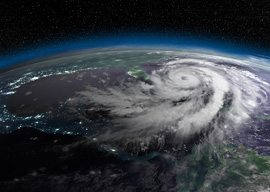
September 15, 2017

Source: Bigstock
Climate change has therefore become the great issue of our time, and unless there is a reversal of scientific opinion, which is possible but seems unlikely, its reality and the dangers it brings with it are evidently more widely accepted than before. The recent catastrophic storms and hurricanes in the Caribbean and the Southern states of the USA must have persuaded many skeptics to change their minds. It now seems safer and wiser to bet on the reality of damaging climate change than to bet against it.
It is, of course, a gamble either way. We may, acting on the assumption that human activity is responsible for this change, adopt expensive and disruptive measures, doing everything that the scientists recommend, and find that it doesn’t make a blind bit of difference because human influence on the natural world is much less than we suppose. In any case it will probably take decades before we know if our response is effective. On the other hand, if we take the skeptical gamble, we may discover that the doomsayers were right and that it is too late even to try to do anything about it.
It’s really a variant of Pascal’s wager. That, formulated by the 17th-century French writer/philosopher Blaise Pascal, concerned the existence of God. For Pascal, if you choose to believe in God and the possibility of eternal life, and God doesn’t in fact exist, you lose nothing except perhaps some marginal pleasures in your life. On the other hand, if you bet that there is no God and act accordingly, and lose your bet because he does exist, you lose everything.
Likewise with damaging climate change. If we act as if this is not really happening and don’t try to reverse or retard it, and prove to be wrong, then we are really in the soup. So, ultimately, it seems sensible to act on the assumption that man-made climate change is a reality, and change our ways in an attempt to retard or reverse it.